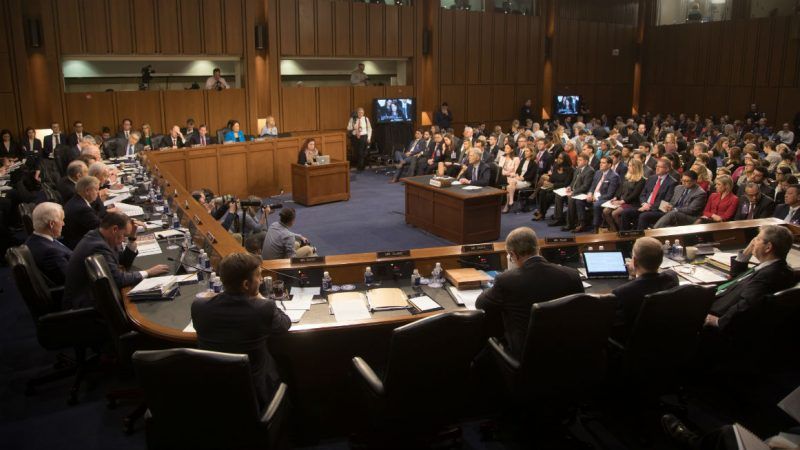Hula Hoops and Chinese Food at Supreme Court Confirmation Hearings
Are we squandering a rare opportunity to learn more about the justices?

At Supreme Court confirmation hearings, potential justices sit before a committee of senators who scrutinize everything from their views to their experience to their personal lives. But these hearings are not always as straight-faced as their significance might suggest.
During Elena Kagan's 2010 confirmation hearing, for example, Sen. Lindsey Graham (R–S.C.) asked the nominee where she was on Christmas Day. "You know, like all Jews, I was probably at a Chinese restaurant," she replied. During Antonin Scalia's 1986 confirmation hearing, Sen. Patrick Leahy (D–Vt.) noted amicably, "I would assume, in reading Mrs. Scalia's maiden name [McCarthy], that your children have really the 'best of all possible worlds'—an Italian parent and an Irish parent."
William Rehnquist's hearing that same year featured some more amusing asides. At one point, Sen. Orrin Hatch (R–Utah) complained about some inquiries into the nominee's early career. "Just to put these events in their proper perspective," he observed, "I think it is important to note that at that time the hula hoop was still a decade from its heyday—Bonanza and The Mouseketeer Club would not appear for many years."
During Neil Gorsuch's hearing in 2017, Sen. Ted Cruz (R–Texas) asked the nominee about his history of taking his clerks to watch what is known as "mutton busting." Gorsuch went on to explain, "Mutton busting, as you know, comes sort of like bronco busting for adults. You take a poor little kid. You find a sheep, and you attach the one to the other and see how long they can hold on."
"I noticed you smoke a pipe," quipped Sen. Howell Heflin (D–Ala.) during Scalia's hearing. "It may well be that someday you may have to rule in the right of privacy as to whether or not an individual can smoke a pipe in his study or in his bedroom, so I hope you take care of us smokers one of these days."
These moments of humor can offer pleasant breaks from the long stretches of political grandstanding that tend to dominate these hearings. But they can also touch on serious issues. Kagan's joke about being Jewish on Christmas, for instance, came during a discussion about terrorism. And Helfin's strange comment about smoking was an allusion to the legal debates about privacy.
Other jokes may reveal something about the nominee. Leahy's side note about Scalia's children is strange to read today, but given that Scalia was the first Italian-American to sit on the Court, it was a more significant statement at the time. Hatch's pop culture references illustrated how much time had passed since Rehnquist's early career. And Gorsuch's mutton-busting trips with his clerks surely revealed something about the nominee's personality.
But the majority of the discussions during these hearings do little to reveal the nuances of nominees' beliefs or their views on the judiciary's role in our republic. The result is a Supreme Court that few understand and a public perception of the Court that is shaped by politicians and other partisans rather than by the justices themselves.
This problem is compounded by the fact that once a justice moves into his or her new chambers on 1 First Street NE, many Americans will never again see or hear the justice in quite the same way. There is the occasional talk show interview or documentary appearance, but most justices avoid the spotlight, limiting their public engagement to speeches before conferences, guest lectures in law schools, and one-off comments to the media.
Even when justices make public appearances, there is often little interest from the general public. Last month, Justices Kagan and Samuel Alito testified before Congress. Yet there was little media coverage of the event, and plenty of seats were available in the small committee room. Such lack of attention can help explain how these important figures slip into anonymity. In a recent poll, 52 percent of Americans could not name a single Supreme Court justice.
Confirmation hearings offer a national forum for potential justices to explain their views on a judge's role and their vision for the Court. While the nation is watching, it would be refreshing to hear a nominee explain how judges reach decisions, why their decisions may be different from those of their colleagues, and how they are able to disagree without being disagreeable.
And once on the Court, justices ought to strive to be more open. Doing so, as one circuit judge remarked, has the ability "to humanize and demystify the judiciary."


Show Comments (8)